ebaan [èbã́ã̀] n. now; at this time.
(Also: ebanban; ewaan; ewanwan).

ebaba [èbàbá] n. address term, used
mainly by the young, for father.
Other terms include evbavba; erha.

ebafọ [èbáfɔ̀] n. a small plant whose
leaves are used as vegetable in afọ soup.

ebakhuẹ [èbáxwɛ̀] n. the red feather-
tail of a parrot.

ebakpẹ [èbákpɛ] n. a plant (millettia
thonningii) whose leaves are used for
medication against dysentery.
%%

ebamẹmẹ [èbámɛ̃̀mɛ̃̀] n. the leaf of a
local shrub with abrasive surface, and
used for cleaning and shining rough
surfaces.

eban [èbã́] n. the act of stripping off
clothes (cf. ban).

ebe [èbé] n. 1. leaf; 2. vegetable; 3.
paper; book.

ebeebe [èbéèbé] n. 1. greenish colour;
2. foliage.

ebekhue [èbéxwé] n. the leaves of
“garden egg” used in a variety of soups
$Page 021$

as vegetable.

ebeni [èbénĩ̀] n. a kind of leaf used for
making the thatched roof of traditional
houses.

ebevbarrie [èbéʋàryɛ́] n. (< ebe +
evbarie) a kind of fish (usually smoked)
used in soups and stews.

ebẹn1 [èbɛ̃̀] n. a boundary, a line of
demarkation, especially between
adjacent farms.

ebẹn2 [èbɛ̃̀] n. dangerous debris, usu-
ally in the form of broken bottles
and metal rods used to prevent tres-
passers from farms and other restricted
territories.
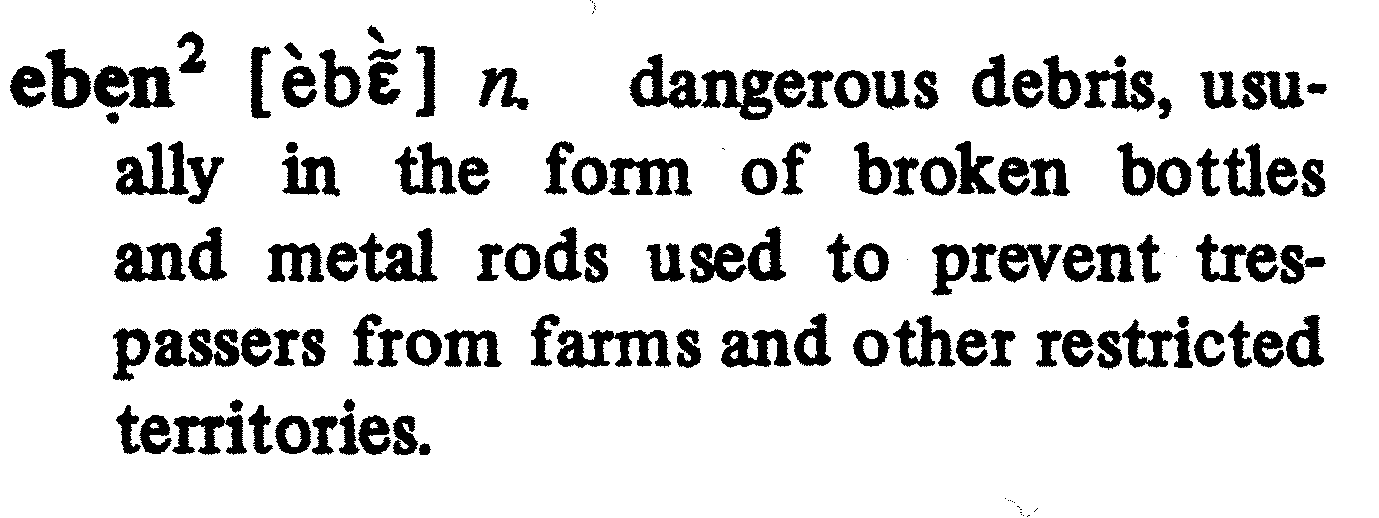
ebi [èbí] n. night; darkness; ebi ro:
“darkness has fallen.” (Also ebiebi);
ebiebi so: “night has fallen i.e. it has
become dark.”

ebiakabianu [èbyàkábyanu] n. non-
sensical talk; unintelligible utterances.

ebiavan [èbyávã̀] n. “afternoon dark-
ness”: eclipse of the sun.

ebibi [èbíbì] n. aimless groping or
wandering.

ebiẹ [èbíɛ̀] n. beer (cf. Engl.).

ebiẹba [èbíɛ̀bá] n. a local leaf tradi-
tionally used for parcelling cooked
food such as boiled rice (izẹ) or ekusu
(a kind of corn pudding), etc.

ebihieghe [èbíhyèɣè] n. (< ebe +
ihieghe) the fresh leaves of a tree
(Myrianthus arboreus) used as vegetable
in a variety of soup.

ebitẹtẹ [èbítɛ̀tɛ̀] n. the leaves of a
small plant used as vegetables in afọ
soup.
%%

ebiwinna [èbíwĩ̀nã̀] n. “work paper”:
job application.

ebiyẹn [èbíyɛ̃̀] n. report; newsletter.

ebiyọyọ [ebíyɔ́yɔ́] n. another name
for ebitẹtẹ.

ebo [ébo] n. white-man; European.

eboriwo [èbóɽíwò] n. (< ebe + oriwo)
“bitter leaf”, the leaves of a shrub,
bitter in taste, often used with ikpogi
(melon seeds) to make a common
Edo soup.
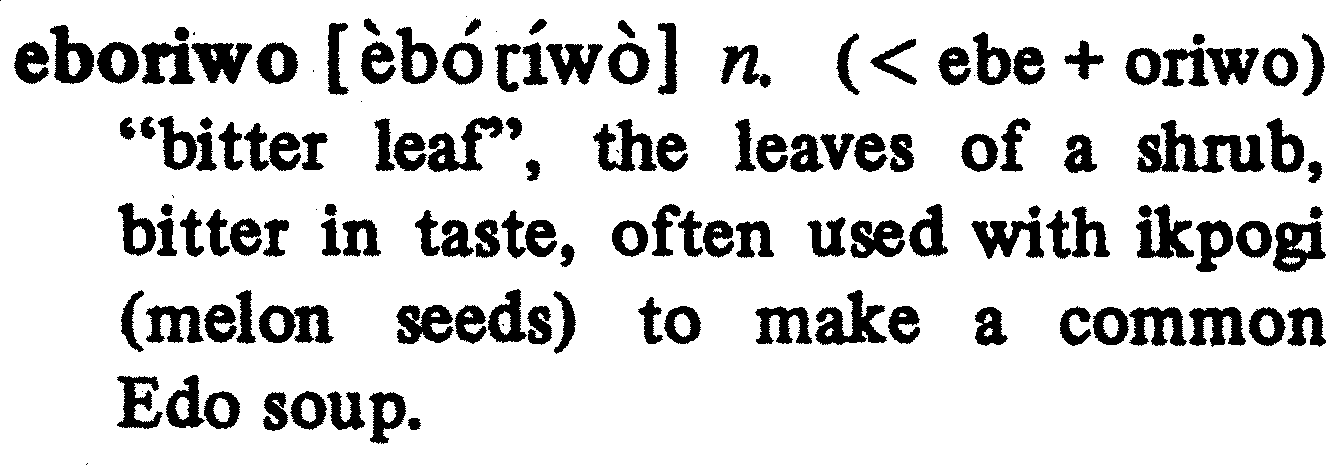
ebọbọzi [èbɔ̀bɔ̀zí] n. thin slices of
boiled cassava, soaked in cold water,
usually eaten as a snack, rather than
as a meal.

ebọdọndọn [èbɔ́dɔ̃dɔ̃] n. “water leaf”;
the leaves of a small plant (Talinum
triangulare) used as vegetable in pre-
paring a variety of soups.

ebọlu [èbɔ́lù] n. ball (also; ibọlu) (cf.
Engl.) (also ibọru/ebọru).

ebọrhẹrhẹ [èbɔ́řɛ̀řɛ́] n. a variety of
local vegetable used in preparing soup.

ebubẹ [èbùbɛ̀] n. fine sand; dust.

ebuka [ébúkà] n. food canteen.

ebuluku [èbùlúkù] n. a full-gathered
wrap-around skirt that women tradi-
tionally wear under their wrappers.
It is also worn as an outer garment by
some native priests.

ebumwẹn [èbúɱɛ̃̀] n. “salt leaf” a
creeper (Manniophyton africanum); it
is said to cause itching when touched.

ebumwẹnkhẹn [èbúɱɛ̃̀xɛ̃́] n. “pump-
kin leaf” a creeper whose fresh leaves
are used as vegetable in soup. The
$Page 022$

seeds of the fruit are also edible when
boiled.

eda [èdá] n. rain water collected from
the eaves of a roof. (cf. daa3).

Edaikẹn [èdàíkɛ̃́] n. the title of the
heir-apparent to the Ẹdo throne; his
court is at Uselu.

edanmwẹn [èdã́ɱɛ̃̀] n. examination
(cf. danmwẹn2).

ede [èdé] n. bush-cow; buffalo. (also
ẹhan).

edede [èdèdé] n. old woman.

edẹ [èdɛ́] n. grey hair.

edi [édí] n. civet-cat.

edigue [èdìgwè] n. villager; unsophis-
ticated person.

edigun [èdígũ̀] n. iron.

ediọn [èdỹɔ̃̀] n. 1. the elders of a clan
or village usually about 42 and above
in age; 2. pl. of ọdiọn: “older ones.”

ediọnmwan [èdỹɔ̃̀ɱã́] n. old man.

ediran [èdíɽ̃ã̀] n. this way; this side;
this part; (also oderan: < odẹ + eran).

edirẹva [èdírɛ́và] n. driver of a vehicle
(cf. Engl.: driver) (also edrrẹva).

Edogun [èdógṹ] n. title of a war-
chief.

Edọhẹn [èdòhɛ̃́] n. title of one of
the chiefs belonging to the Uzama.

edọkita [èdɔ́kítà] n. doctor (cf. Engl.)
(also ẹdokita).

edọn [édɔ̃̀] n. flying termite.
%%

edu [èdú] n. translation (used with the
vb. zẹ).

ee [éé] int. response to most greetings
and directives: A: lare! B: ee! ― A:
come here! B: okay!.

efa [èfá] n. disgrace; embarrassment.

efada [èfàdá] n. a Roman Catholic
Father. (cf. Engl.).

efẹn [èfɛ̃̀] n. 1. side of the body.

efẹnrhinyẹn [èfɛ̃̀řĩ́ỹɛ̃̀] n. a snack pre-
pared from unsifted cassava, eaten
mainly in the delta area of Bendel
State.

efiaide [èfyaídè] n. Friday (cf. Engl.).

efoni [èfónì] n. telephone.

efoto [èfòtó] n. photograph; picture.

efọnkpa [èfɔ̃́k͡pá] n. 1. a certain place;
a certain location; 2. the same place
(also ehọkpa).

efukẹ [èfùkɛ̀] int. an expression which
implies that what had been said was
a joke, a lie or a bluff.

efun [èfṹ] n. boneless meat; flesh of
animals or human beings; muscle.
(also ifun).

ega-ifi [ègáifì] n. an enclosed area in
which traps are set.

egalahi [ègàláàhì] n. a tiny drinking
glass used for serving liqueur.

egedege [ègédége] n. storey building.

egilẹ [égìlɛ̀] n. snail.

egirramu [ègírámù] n. gram (cf. Engl.).
$Page 023$

egirrepi [ègírépì] n. grape-fruit (cf.
Engl.).

egosimeti [ègòsìmétì] n. gold-smith
(cf. Engl.).

Egọ [ègɔ̀] n. a Bini village situated on
the road leading to Siluko.

eguẹva [ègùɛ́và] n. guava. (cf. Engl.).

egui [ègwí] n. land-tortoise.

eguọ [ègwɔ̀] n. a feat; an exploit; a
performance.

egba [èg͡bá] n. hunter’s ambush.

egbaha [ég͡bàhà] n. the beam placed
above a door to support the wall
above it in traditional houses.

egbakhian [èg͡bàxyã́] n. 1. lovers; 2.
a close friend of any sex.

egbalaka [ég͡bàlàkà] n. ladder.

egbe1 [èg͡bé] n. 1. body; egbe hia khia
mwẹn ― “all my body hurts me”; 2.
bulk: ẹkpẹtin na mwẹn egbe ― “This
box has bulk.”

egbe2 [èg͡bé] n. one another; each
other: Iran tuẹ egbe ― “They greeted
each other.”

egbe3 [èg͡bé] n. kind, variety; egbe ọna
ẹre ọ yẹẹ mwẹn ― “It is this kind that
pleases me; i.e. This is the kind I like.”

egbe4 [èg͡bé] adv. in spite of; though:
Egbe ne i ya khama ọnrẹn ighẹ i dee,
i ma ye vba ọre vbe owa ― “In spite
of the fact that I had told him that I
was coming, I still did not meet him
at home.”
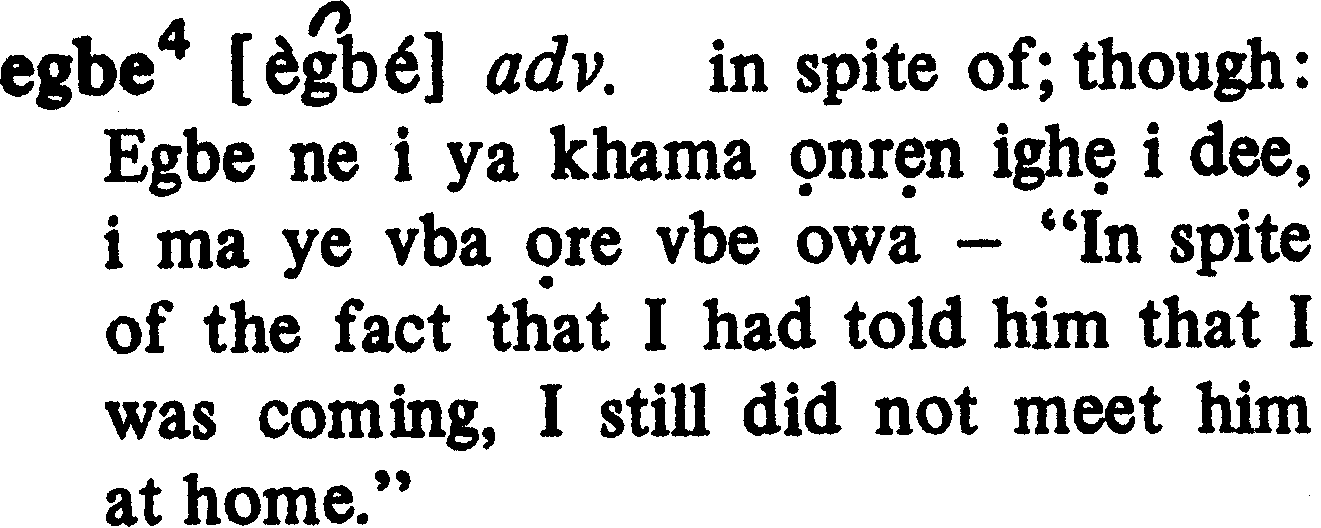
egbebalọmwẹn [èg͡bèbálɔ́ɱɛ̃̀] n. hot
temper; quick temper. (also ibalegbe).
%%

egbedamwẹn [èg͡bèdáɱɛ̃̀] n. being
acutely sensitive to physical or emo-
tional discomfort; being accutely
affected by external stimuli, especially
those that cause pain.

egbegiengiẹnmwẹn [ègbègỹɛ̃́gỹɛ̃ɱɛ̃̀]\n. being incapable of enduring or
accommodating pain.

egbekanmwẹn [èg͡bèkã́ɱɛ̃̀] n. being
easily irritable.

egbekẹn [èg͡békɛ̃̀] n. wall (especially
of a house).

egbemumwẹn [ègbèmúɱɛ̃̀] n. excite-
ment.

egberọkhọmwẹn [èg͡bèɽɔ́xɔ́ɱɛ̃̀] n.
peace and comfort; luxury and lei-
sure.

egberranmwẹn [èg͡bèrã́ɱɛ̃̀] n. health.

egbewọmwẹn [èg͡bèwɔ́ɱɛ̃̀] n. tired-
ness and fatigue.

egbowa [èg͡bówà] n. the out-house
used for toilet facilities: Egbowa
nokhua “the big out-house; i.e. latrine”;
egbowa nekherhe ― “urinary”.

égbọ [ég͡bɔ̀] n. a variety of traditional
songs sung on solemn occasions such
as funerals.

ègbọ [èg͡bɔ́] n. the phase of tree-felling
in the process of making a new farm.

egbọn [ég͡bɔ̃̀] n. a high fence made of
ikhinmwin trees, and standing at the
entrance of a village (ughe); it serves
to ward off evil spirits and bad charms
from the village.

egbọna [ègbɔ́nà] n. (< egbe3 + ọna)
“this kind”; this variety (cf. egbe3 ).
$Page 024$

egbọghọ [égbɔ̀ɣɔ̀] n. native tobacco;
it has a very pungent smell.

egbu [égbú] n. a kind of woodpecker
which has a very big head and short
beak.

Eghaẹvbo [èɣàɛ̀ʋò] n. the title of two
sets of Edo chiefs: 1. Eghaẹvbo Nore,
and 2. Eghaẹvbo Nogbe. The latter is
made up of officials of the palace
(eguae), while the former consists of
town chiefs; such as Iyasẹ, Esọgban,
Esọn and Osuma.
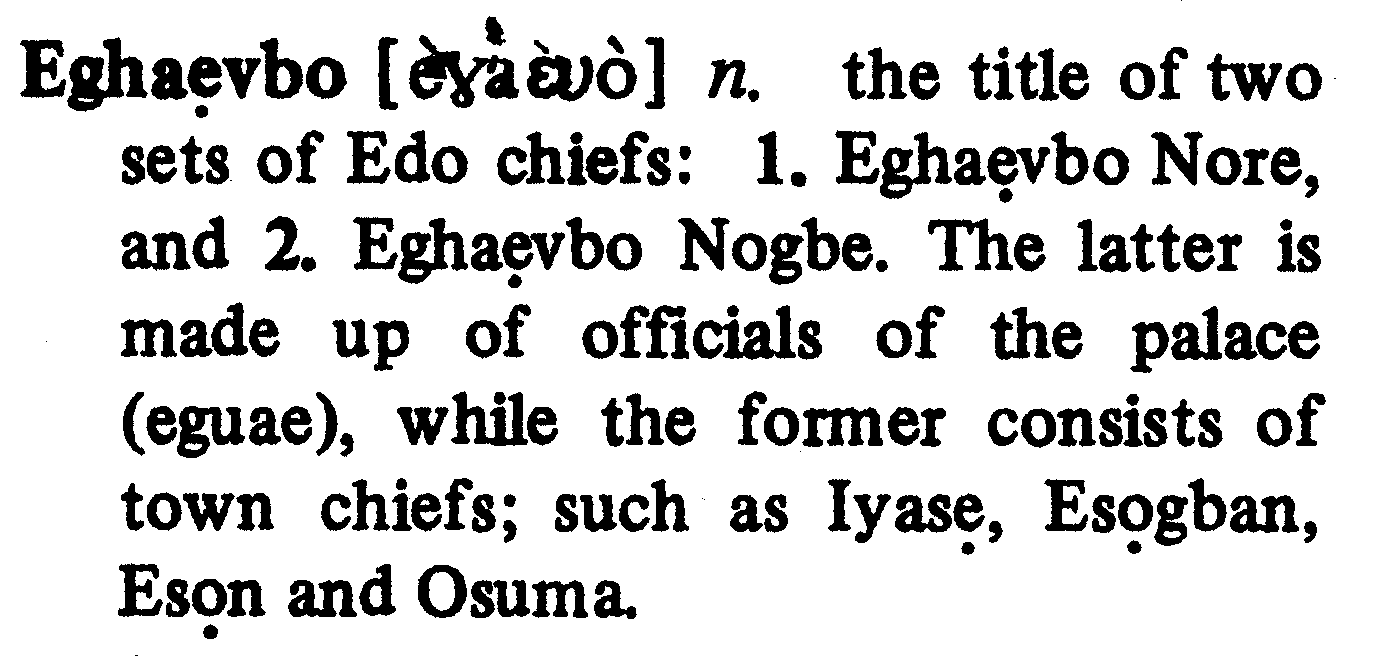
eghan1 [éɣã̀] n. metal chain used for
harnessing convicts.

eghan2 [éɣã̀] n. imprisonment; con-
finement.

eghẹrẹ [èɣɛ́ɽɛ̀] n. idleness; something of
ineffective value; something lacking in
purpose or worth.

eghian [éɣỹã̀] n. enemy; 2. pl. of
oghian ― enemy.

egho [èɣó] n. the over-night rubbish
lying in the house before it is
swept in the morning.

egho [èɣó] n. (of food) staleness, re-
sulting from lack of preservatives,
especially over-night; 2. (of persons)
the bad breath before mouth is cleaned
in the morning.

eghorẹ [èɣóɽɛ̀] n. an idiomatic expres-
sion for pregnancy.

eghọẹn [èɣɔ̃́ɛ̃̀] n. foreigner.

eghute [éɣúté] n. 1. beach; riverside;
2. port; harbour.

eha [èhá] num. three.

Ehaẹkpẹn [èháɛkpɛ̃̀] n. title of a
%%

category of Edo chiefs.

ehan [éhã̀] num. six.

ehẹankọn [èhɛ̃́ã̀kɔ̃̀] n. plaque on
teeth.

ehaya [èháyà] n. rent; hire: ọ mu
imọto ẹre ye ehaya ― “He put his
car on rent.”

ehe1 [èhé] n. 1. place; location (also
eke) De ehe ne i gha mu enrẹn yi ―
“What place shall I put it?” 2. journey:
I gha ye ehe akhuẹ ― “I shall go on
a journey tomorrow.”

ehe2 [èhé] n. menstruation.

eheha [èhéhà] n. groups of three;
threes.

eheikehe [èhéikèhé] n. anywhere;
wherever: eheikehe ne u rhirhi na
miẹ ọnrẹn, u ghu khama mwẹn ―
“wherever you happen to find it,
you tell me.”
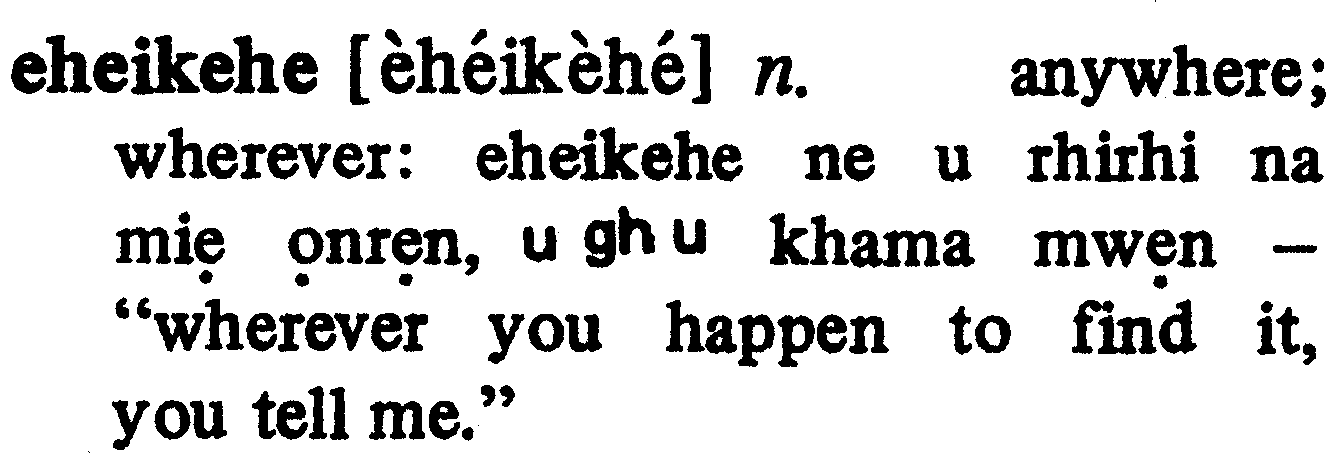
ehẹn [éhɛ̃̀] n. fish.

Ehẹngbuda [èhɛ̃́gbúdà] n. Name of a
past Oba of Benin who reigned from
about 1578 to about 1607 (Egharevba
1968:73).

Ehẹnmihẹn [èhɛ̃̀mĩ́hɛ̃̀] n. name of a
past Ọba of Benin who reigned in
the first half of the thirteenth century
(Egharevba 1968:73).

ẹhẹnnẹdẹn [èhɛ̃́nɛ̃́dɛ̃́] n. perfect health
and wholesomeness.

ehia [éhya] ind quant. all (also hia
when it occurs as a modifier.)

ehiagha1 [èhyaɣà] n. cf. ihiagha.

ehiagha2 [èhyaɣà] n. (with ivin) palm
$Page 025$

kernel: Ọ ya ivin-ehiagha wọn igari ―
“He used palm kernel to drink garri;
i.e. he ate garri with palm kernels.”

ehianmwẹn [éhyã́ɱɛ̃̀] n. the hard shell
of a fruit or nut: ehianmwẹn-ivin ―
“coconut shells”.

ehiẹn [éhỹɛ̃́] n. nails (of human); claws
(of birds) (also ihiẹn).

ehionbọ [éhyṍbɔ̀] n. (< ehiẹn-obọ)
finger-nails (also ihionbọ).

ehionwẹ [éhyṍwẹ̀] n. (< ehiẹn-owe)
toe-nails (also ihionwẹ).

ehọ1 [èhɔ́] n. 1. ear. 2. edge.

ehọ2 [èhɔ́] n. an annual festival of
sacrifice to the ancestors.

Ehọ [èhɔ̀] n. Ehor, a town on the
boundary between Ẹdo and Esan-
speaking people.

ehọkpa [èhɔ́kpá] n. same as efọnkpa.

Ehọndọn [èhɔ̃́dɔ̃́] n. title of a chief
whose special function is to oversee
the slaughtering and butchering of
sacrificial animals at all the Oba’s
sacrifices.

ehọnmwẹn [èhɔ̃́ɱɛ̃̀] n. purification.

Eka [èká] n. The Ika people and their
language. They are a branch of the
Igbo-Speaking people.

eka [ékà] n. a variety of fried tradi-
tional cake made from maize or beans,
and eaten mainly as snack. ekaere ―
fried bean cake.

ekabita [èkábítà] n. carpenter (cf.
Engl.).

ekaebo [ékáebò] n. (< eka + ebo):
%%

“Whiteman’s cake”: biscuits.

ekagha [èkàɣà] n. muzzle; gag.

ekainkain [èkãĩ́kãĩ́] n. traditionally
brewed gin.

ekalaka [èkàlákà] n. drinking-glass;
tumbler (cf. Port.: caneca).

ekasa1 [èkàsà] n. 1. a tree
(Omphalocarpum procerum); 2. the
rattle made from the husks of the
seeds of the tree, strung with raffia
and worn around the ankles by
dancers.
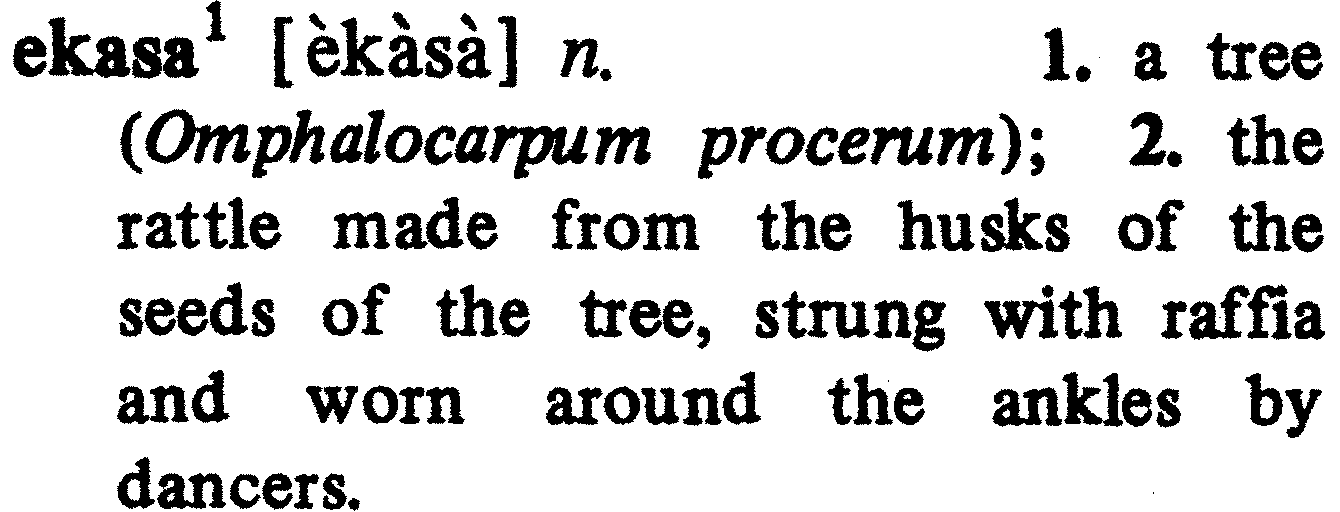
ekasa2 [èkàsà] n. a very colourful
dance performed by a dance troupe
from Ogbelaka as part of the ceremo-
nies to celebrate the Oba’s coronation.

ekasiu [èkàsiú] n. cashew: the plant,
the fruit and the nut. (cf. Engl.).

Ekatakpi [èkátákpì] n. a nickname
for a short and fat person, with short
limbs; it derives from a character in
Edo folklore who was a stump.

ekatapila [èkàtàpílà] n. caterpillar;
truck (cf. Engl.).

eke [èké] n. place; location: I yo eke
ne ọ na winna ― “I visited the place
where he works.” (cf. ehe).

eke [èké] n. stunted round yam, used
mainly for planting.

ekesọgban [ékésɔ́gbã̀] num. 25. Also
isẹnyan-ugie.

ekesugie [èkésùgyé] num. 15.

ekẹkẹrẹbo [èkɛ̀kɛ̀ɽɛ́bò] n. something
of little worth or consequence.

ekẹn1 [èkɛ̃́] n. one of the four days
$Page 026$

in the traditional week on which no
market-day falls. The other days of
the week are: ẹkiọba; ekẹn naka;
and agbado.

ekẹ́n2 [èkɛ̃́] n. egg.

ekẹ̀n [èkɛ̃̀] n. soil, mud; 2. wall of a
house.

ekẹnnekhui [èkɛ̃̀néxuì] n. (< ekẹn +
nekhui)^― “black soil”; humus.

ekẹnnẹkẹnnẹ [èkɛ̃̀nɛ̃̀kɛ̃́nɛ̃̀] n. a
spotted design; a pattern of spots:
ẹwu ẹre gbẹnne ẹkẹnnẹkẹnnẹ ― “His
garment is spotted in design.”

ekẹtẹkẹtẹ [èkɛ́tɛ́kɛ́tɛ́] n. ass; donkey.

eki [èkí] n. trick.

eki [ékì] n. (same as ukuoki) a pad
placed to wedge a load on the head.

ekia [ékyá] n. penis.

ekiawa [ékyáwà] n. a shrub, Erythrina
species.

ekigbesiyeha [èkígbésìyéhà] num. 50.

ekigbesiyenẹ [èkígbésìyénɛ̃̀] num. 70.

ekigbesiyisẹn [èkígbésìyísɛ̀] num. 90.

ekilo [èkílò] n. kilogram (cf. Engl.).

ekilomita [èkìlómítà] n. kilometre (cf.
Engl.).

ekinyanwo [èkĩ́ỹã́wó] n. guinea-fowl
egg (< ekẹn + iyanwo) (cf. Yoruba
ẹyin-awo).

ekiosisi [ékyósísí] n. (< ekia + osisi)
“penis of gun”: trigger of a gun.

ekita [ékítà] n. dog (also awa;
%%

ovbiakota).

eko1 [èkó] n. temporary camp; settle-
ment used for purposes of hunting,
farming and, in the past, war.

Eko2 [èkó] n. the Edo name of Lagos,
which originated with the use of the
territory as a war-camp by Edo warriors
in the 15th and 16th centuries.

ekoko [èkókò] n. Utte masquerades,
noted for the long chins of their
masks. The masquerade is said to
date back to the reign of Oba Ohẹn
in the 14th century.
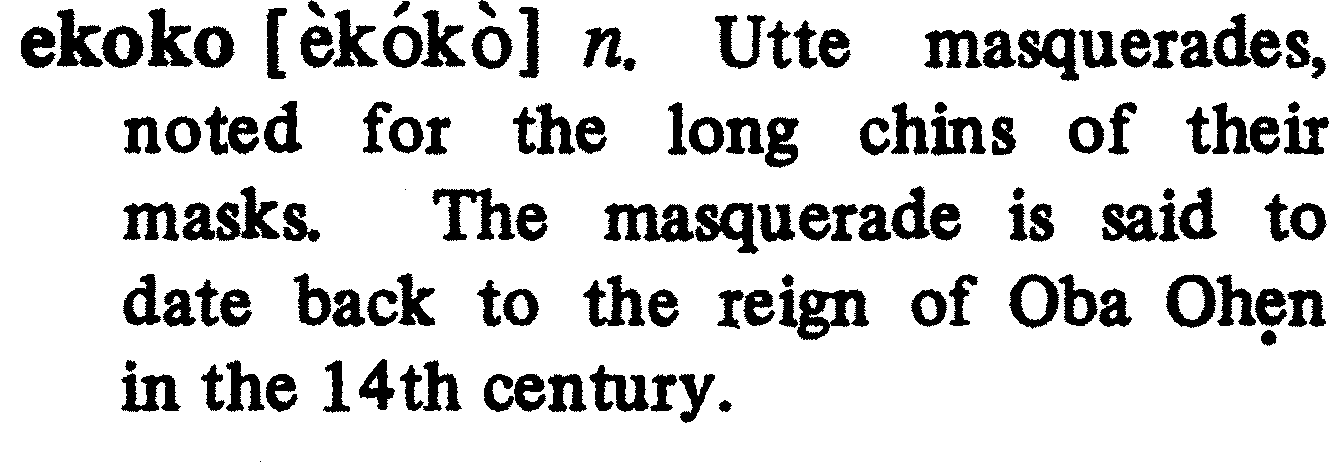
ekokodia [èkòkódyà] n. ceremonial
name for coconut.

ekokohiẹn [ekókóhỹɛ̃̀] n. a long snail’s
shell previously used as native spoon.

ekokoma [èkókómà] n. a variety of
native pop dance.

ekokoo [èkòkóò] n. cocoa (cf. Engl.).

ekonbuẹ [èkõbúɛ] n. (< ekẹ̀n + obuẹ)
clay; soil with a large proportion of
clay.

ekongbe [èkṍgbè] n. (< ekẹ̀n + ogbe)
“wall of Ogbe”; the wall that encloses
the Oba’s palace in Benin City.

ekororo [ékóroro] n. (< eka + ororo)
bean cakes fried in groundnut oil,
rather than palm oil.

ekọka [ékɔ́kà] n. (< eka + ọka) “maize
cake” traditional cake made from
ground corn, and fried in palm oil.

ekọnka [èkɔ̃́kà] n. the dried out cob
of corn to which the grains are
attached in an ear of maize.

ekọnkhọkhọ [èkɔ̃́xɔxɔ̀] n. (< ekẹ́n +
$Page 027$

ọkhọkhọ) chicken egg.

ekọtu [èkɔ́tù] n. law-court (cf. Engl.).
(also ikotu).

eku [èkú] n. malice.

ekuabọ [ékwábɔ̀] n. upper arm.

ekuawẹ [ékwáwɛ̀] n. thigh.

ekuẹ [ékwɛ́] n. bellows.

ekuku [èkúkù] n. cook (cf. Engl.).

ekuọmọ [ékwɔ́mɔ̀] n. a fat brown rat
(also known as ẹbete).

ekuu [èkúù] n. semen.

ekuyẹ [èkùyɛ́] n. spoon (cf. Port.:
colher).

ekha [èxá] n. a declaration; an author-
itative statement: Ekha gue Osa ―
“Declarations are with god; i.e. god
proposes.”

ekhae [éxàe] n. sand.

ekhaẹmwẹn [èxàɛɱɛ̃̀] n. chiefs; pl. of
okhaemwen.

ekhaosisi [éxàosísí] n. (< ekhae + osisi)
“sand of gun”: gun-powder.

ekhàrha [èxàřà] n. umbrella (also
ugbinnamẹ).

ekhárha [èxářà] n. recitation; recital.

ekhekhae [éxèxàe] n. (< ekhae +
ekhae) full of sand; being sandy.

ekherhe [èxéřé] n. a little bit (of
something).

ekhẹn [èxɛ̃̀] n. a band of travellers,
whether on foot or by some public
%%

means of transport: ekhẹn ni rrie ẹki
― “travellers going to the market”;
ekhẹn ni rrie ugbo ― “travellers going
to the farm.”

ekhọe1 [éxɔ̀e] n. mind; will: ekhọe
daan ― “wickedness”; “meanness.”

ekhọe2 [éxɔ̀e] n. palm-branch shed of
its leaves, used for tying yams.

ekhuae [éxwàe] n. a group of charm
made of pounded medicines used in
both cursing and blessing rituals.

èkhue [èxwè] n. 1. shame, embarras-
ment. 2. shyness; self-consciousness.

ékhue [éxwé] n. garden-egg; egg plant.

ekhuẹkhuẹ [èxwɛ́xwɛ̀] n. palm-wine
tapped from fallen palm tree (also
udegbotọ).

ekhui [èxwì] n. the scaly ant-eater.

ekhuọrhọ [éxwɔ̀řɔ̀] n. swamp; muddy
soil; slush.

èkpa1 [èk͡pá] n. vomiting; vomit.

èkpa2 [èk͡pá] n. consideration; cause;
Èkpa ruẹ ẹre ọ ya mwẹn rre ― “It
was on account of you that I came.”

ékpa [ék͡pà] n. 1. fist: ọ kuun ékpa da
mwẹn ― “He clenched his fist at me”;
2. hitting with the fist; boxing: ọ fi
mwẹn ékpa ― “He boxed me”.

ekpaghudo [èk͡pàɣúdò] n. a tree,
Albizzia zygia.

ekpakara1 [èk͡pákáɽá] n. a variety of
beetle found mainly on the raffia
palm; it sucks juice out of the cuttings
made by wine-tappers.

ekpakara2 [èk͡pákáɽá] n. convulsion;
$Page 028$

it afflicts mainly children.

ekpakpahunmwangan\[èk͡pàk͡pàhṹɱã̀gã̀] n. scorpion.

ekpalakpala [èk͡pàlàk͡pálá] n. a flat
fish with many bones and rough
scales.

ekpamaku [èk͡pàmákù] n. 1. cor-
rugated iron sheet, used for roofing
modern houses, in place of the tradi-
tional thatch; 2. enamel plate, dish
or bowl used in the household.

ekparhurhu [èk͡pářuřù] n. a variety
of wasp that makes its nest on creepers.
It has a very painful sting.

ekpaye [èk͡pàyɛ̀] n. followers; at-
tendants.

ekpelekpele [èk͡pèlèk͡pélé] n. mosquito
lava swimming under the water surface.

ekpẹkpẹyẹ [èk͡pɛ́k͡pɛ́yɛ́] n. duck. (cf.
Yoruba pẹ́pẹ́yẹ).

ekpẹtẹsi [èk͡pɛ̀tɛ́sì] n. storey building
(also egedege). (cf. Yoruba pẹtẹsi).

ekpinni [ék͡pĩ̀nĩ̀] n. half-penny (cf.
Engl.).

ekpo [èk͡pò] n. 1. masquerade; 2. a
particular masquerade society of young
boys.

ekpokpo [èk͡pók͡pò] n. traditional
bronze toy “guns” which children
mount on wooden holders and shoot
with nails, using match-stick heads
and sand as gun-powder.
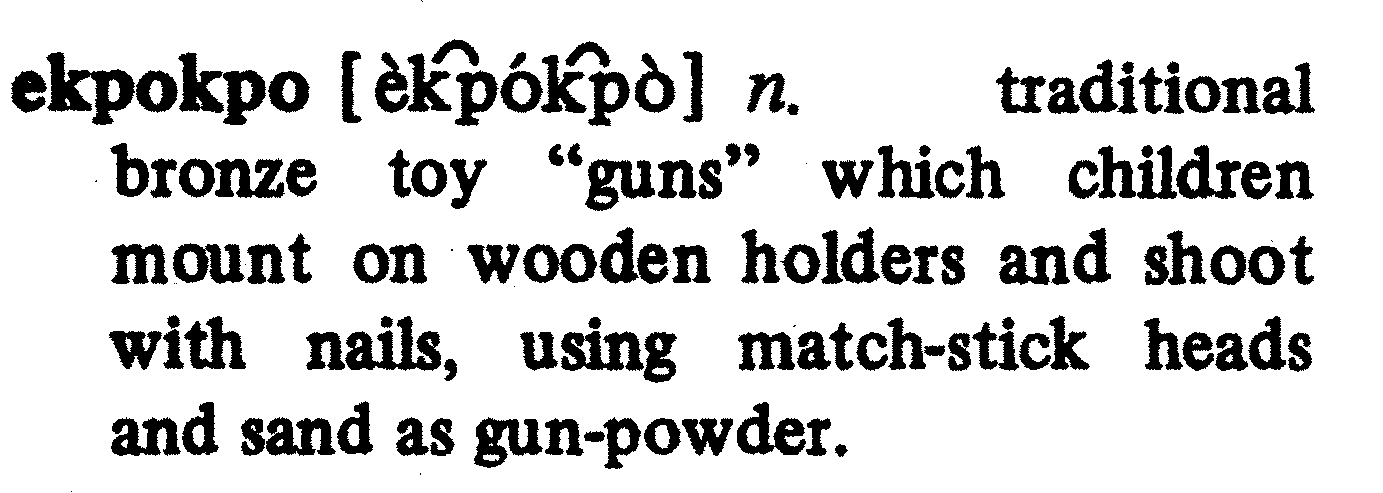
ekpọkọ [èk͡pɔ́kɔ̀] n. milky drivel
emitted by babies, especially after a
meal.

ekpọnkpọndọn [èk͡pɔ̃́k͡pɔ̃dɔ̃́] n. a U-
%%

shaped pin used as a hair dressing
implement by women.

ekpọnmwẹn [èk͡pɔ̃́ɱɛ̃̀] n. 1. thanks-
giving performed by a newly-made
chief in the form of a procession to
the palace and various shrines. 2. (in
the Christian context) a special service
of thanksgiving in which special
offerings are made to the church in
gratitude to God for some special
goodwill recently experienced by
donor ― such as the birth of a child;
successful completion of education,
etc.
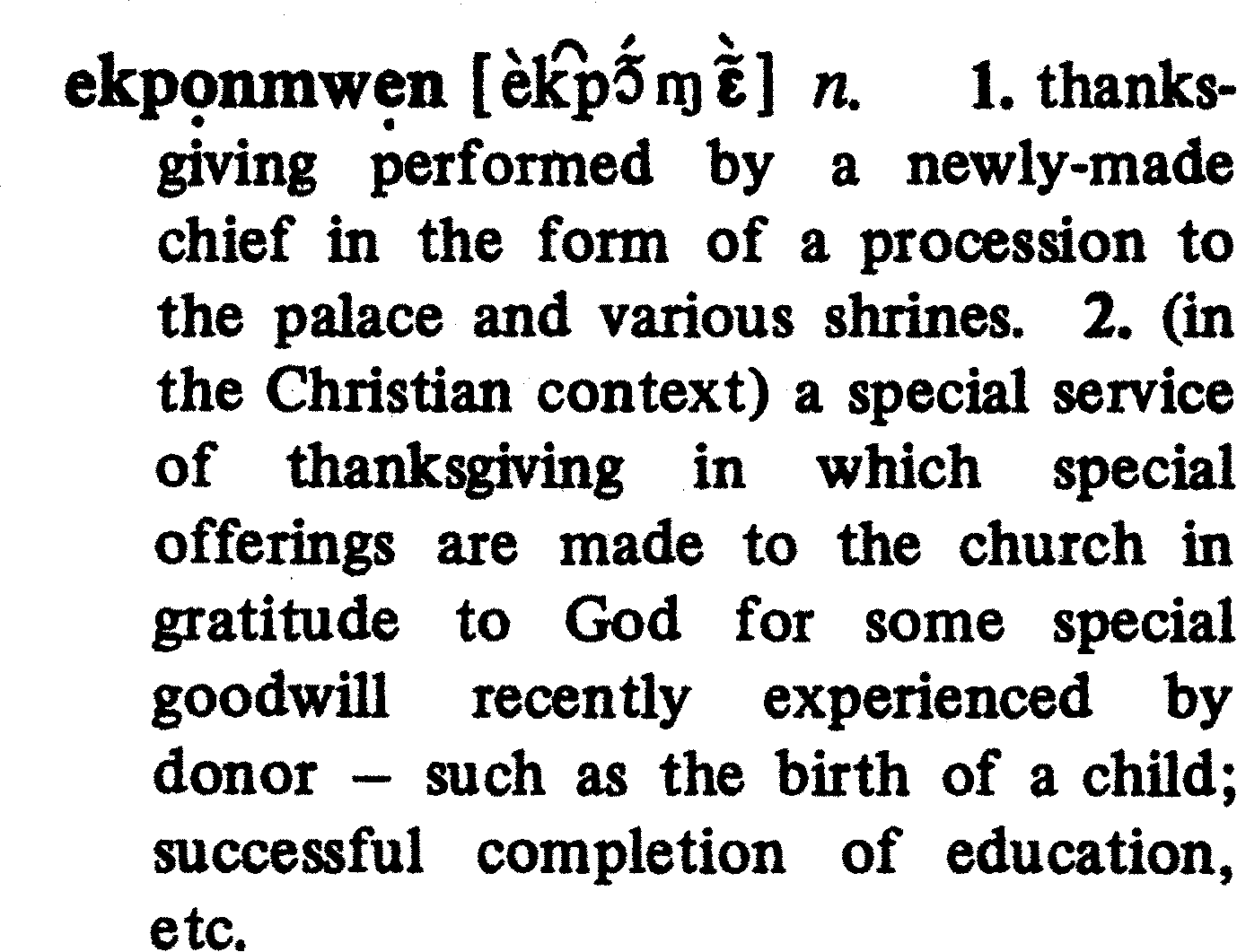
ekpukpu [èk͡púk͡pú] n. a dish prepared
from cassava.

elaghalogho [èláɣáloɣò] n. a bell used
in the Ọkhuahẹ cult, shaped like ẹgogo,
but with a nail inside it.

elalọ [èlálɔ̀] n. ringworm.

elapurhu [èlápuřù] n. fugitive swellings
in the groin.

elarhẹlarhẹ [èlářɛ̀lářɛ̀] n. a disease in
which fluid collects in cavities or
tissues of the body; dropsy.

elawagbọn [èláwagbɔ̃̀] n. maturity and
experience that one acquires through
diversified contacts and exposure.

elẹdẹ [élɛ́dɛ̀] n. domestic pig.

elẹdi [èlɛ́dì] n. lead; lead pencil.

elikhukhu [èlíxùxù] n. pigeon (also
enikhukhu).

elita [èlítà] n. litre (cf. Engl.).

elọya [èlɔ́yà] n. lawyer (also ulaya)
(cf. Engl.).

elukeluke [èlùkélùké] n. river-tortoise
$Page 029$

(also ẹruvbọ).

ema1 [èmà] n. drum; there are dif-
ferent varieties, such as emẹdo;
emighan; emugho; etc.

ema2 [èmà] n. 1. pounded yam; yam
fufu; 2. a collective name for the
different varieties of yam tuber, such
as ikpẹn; igbin; ivu, etc.; 3. the soft
pulp of fruits, usually edible: ema-
orunmwun ― “the pulp of native
pear.”
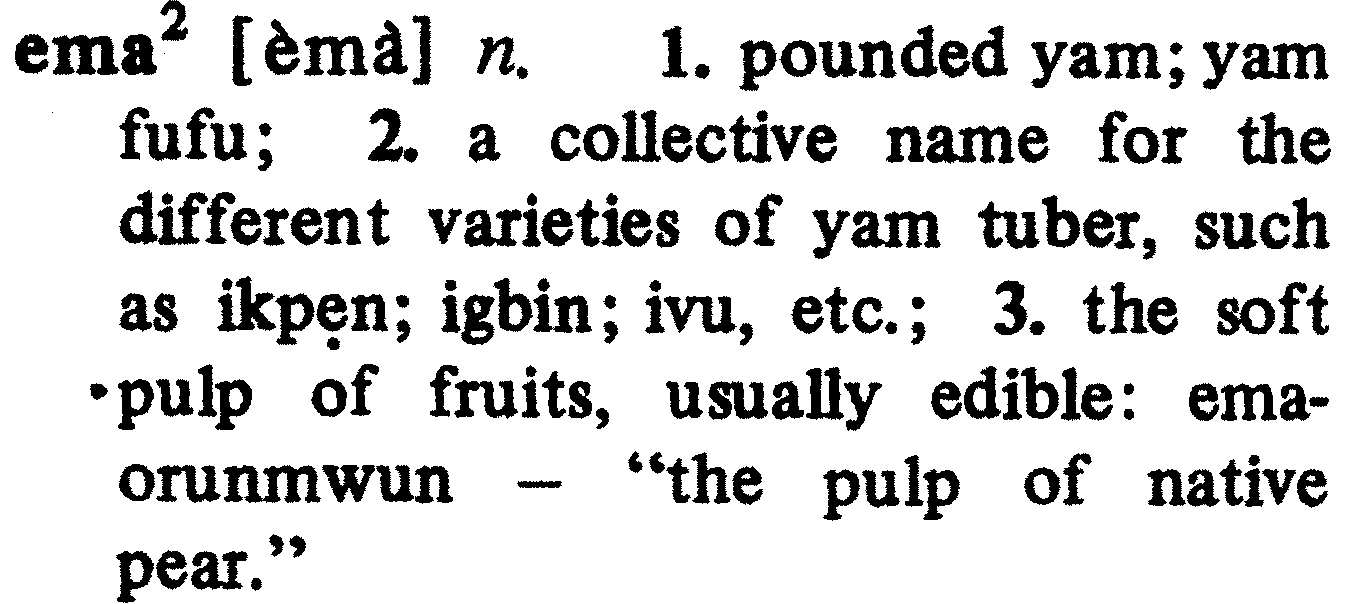
emaba [èmàbà] n. 1. a variety of
drum made from calabash, with a
rattle attached to it; it is played in
palace festivals; 2. a dance for which
the emaba drum is used.

emabule [èmábule] n. a nickname for
a very stupid person.

emaili [èmaílì] n. mile (also ibiriki)
(cf. Engl.).

emakaesọn [èmàkàésɔ̃̀] n. bicycle re-
pairer.

emakaliki [èmàkálìkì] n. mechanic;
auto technician (cf. Engl.).

emasini [èmàsínì] n. machine: 1.
sewing machine; grinding machine and
similar appliances; 2. motor-cycle: U
miẹ emasini ne Ozo da dẹ? Did you
see the motor-cycle that Ojo just
bought?
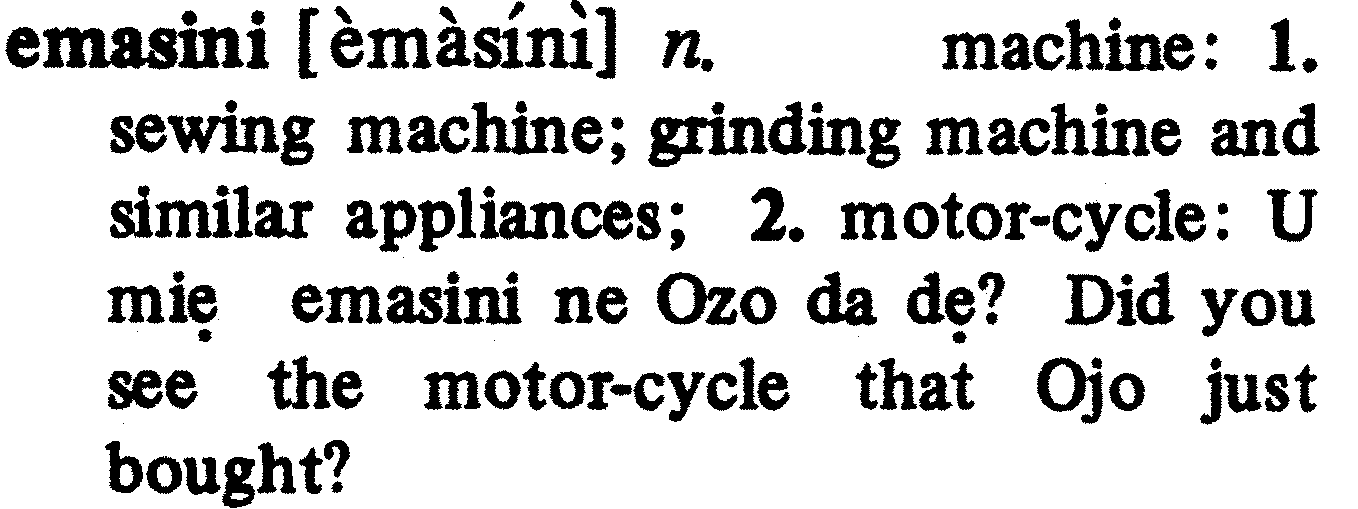
ematọn [èmátɔ̃̀] n. metal; ematọn
nọwegbe ― “steel”.

emazuọkọ [èmázuɔ́kɔ́] n. a very
stupid person; imbecile.

emehe [èméhè] n. 1. reserve; extra
stock kept for future use: Ọ ya evbare
nii zẹ emehe ye iran ihẹ: “He packed
that food for them as reserve”; 2. gift:
%%

Osanobua ọ ya re kpe emehe gun
mwẹn ― “God sent it to me as a gift.”

emẹ [èmɛ̃́ɛ̃̀] n. a general name for
apes; individual varieties, include alazi,
akharho, ọsa, etc.

emẹdo [èmɛ̃̀dò] n. (< ema + Ẹdo)
“drum of Benin”: a big round drum
beaten with one stick and beaten
during ugie ukpetuẹ.

emẹlu [èmɛ̃̀lú] n. bull.

emi [émĩ̀] n. bulk, thickness; weight:
Ọkpan na mwẹn emi ― This plate has
bulk.

emiamwẹn [èmỹã̀ɱɛ̃̀] n. illness (also
uhunmwonva); emiamwẹn-Uhobo ―
“Urhobo sickness”, i.e. gonorrhea.

emiegbe [èmyẽ́gbè] n. beads, worn
around the neck, wrist, or around the
hips. (also emwin-egbe).

emiehọ [èmyẽ́hɔ̀] n. ear-rings (also
emwin-ehọ).

emiekhue [èmyẽ́xwè] n. disgrace;
shame. (also emwienkhue).

emiẹki [èmyɛ̃́kì] n. native pudding
made from yam; it is steamed in wraps
of ebiẹba leaves.

emighan [èmĩ́ɣã̀] n. a drum for chiefs,
placed on the ground and beaten with
two sticks.

emilẹ [émĩ́lɛ̀] n. a variety of red yam.

emiowo [èmyṍwò] n. meat (also
aranmwẹn).

emita [èmĩ́tá] n. meter (cf. Engl.).

emitan [èmítã̀] n. laziness; indolence.
$Page 030$

emitẹ [émĩ̀tɛ̀] n. a dwarf; a stunted
person.

emizaduma [èmĩ́zàdùmã́] n. a war
drum.

emizagbẹdẹ [èmĩ́zàgbɛ́dɛ́] n. a drum
played for the izagbẹdẹ dance.

emọnde [èmɔ̃́dè] n. Monday (cf.
Engl.).

emorhọ [èmṍřɔ̀] n. (< ema-orhọ)
“yam of rainy season”: new yam.

emosima [èmṍsimã̀] n. a kind of
tortoise said to have been charmed
by Ọkhuahẹ, and put in the bush
surrounding his shrines.

emota [èmṍtà] n. (< ema + ota)
“pounded yam of the evening”,
evening meal; supper.

Emotan [èmṍtã̀] n. the name of an
Edo heroine of the 15th century com-
memorated by the bronze statue of a
queen mounted in 1954 at her grave
site where a sacred uruhe tree once
grew, in front of the Ọba market;
this had been cut down inadvertently
by a construction firm. By Ewuare’s
decree, the Oba makes sacrifices to
it, and every traditional burial pro-
cession visits the statue and offers
it cowries and chalk.
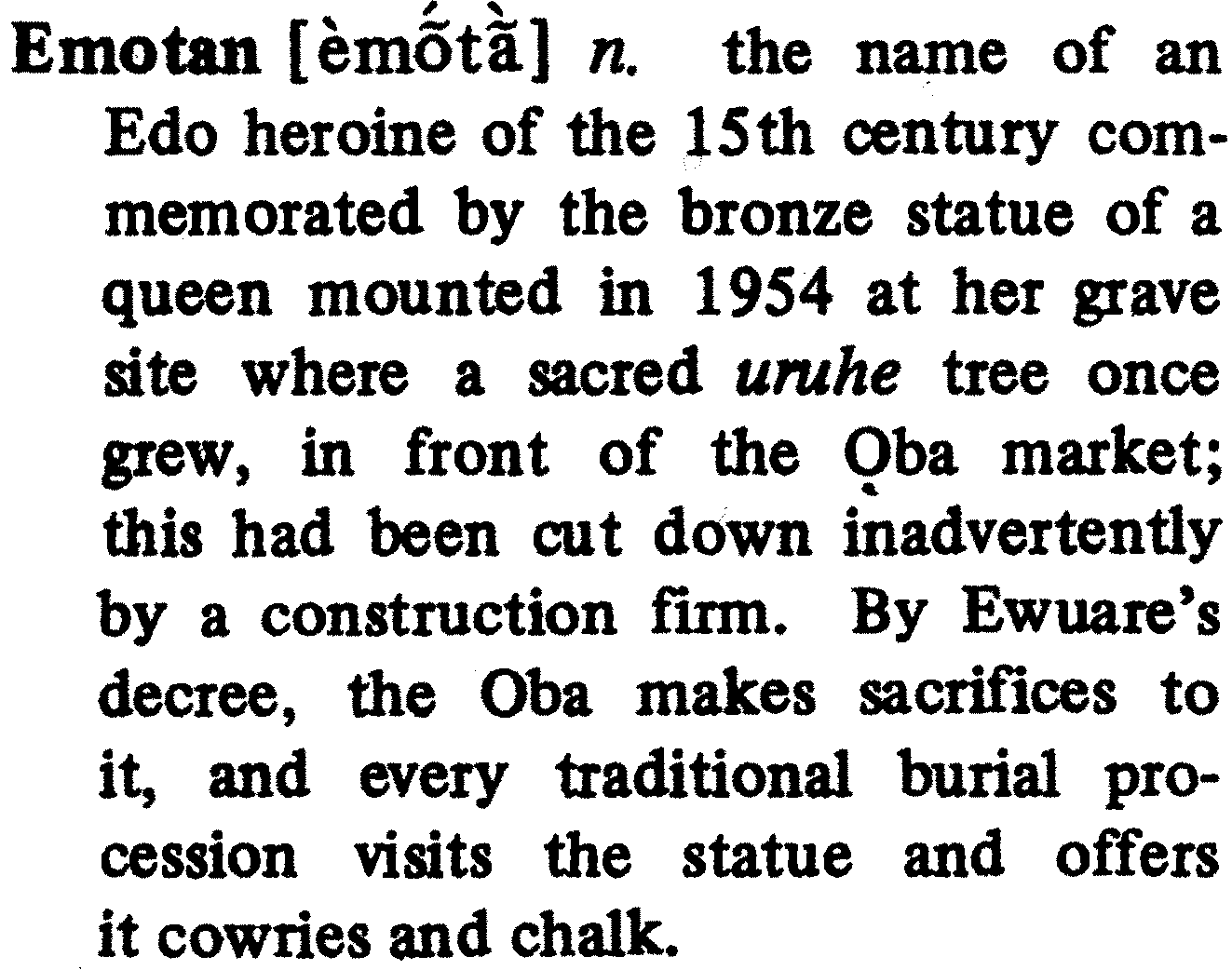
emọ [èmɔ̃́] n. children; off-spring (pl.
of ọmọ).

emọwẹ [èmɔ̃́wɛ̀] n. a variety of white
yam, generally not used for pounding.

emuẹn [èmwɛ̃̀] n. ashes.

emugho [èmṹɣò] n. a small dance-
drum beaten by hand, and used mainly
by women.
%%

emunẹmunẹ [èmũ̀nɛ̃̀mṹnɛ̃̀] n. fire-
fly; glow-worm.

emwan [èɱã́] adv. here.

emwanmwan [èɱã́ɱã̀] n. arrange-
ment; preparation (cf. mwanmwan).

emwẹnmwẹn [èɱɛ̃́ɱɛ̃̀ɛ̃̀] n. madness.

emwienhọ [eɱyẽhɔ] n. ear-rings (also
emiehọ).

emwienkhue [èɱĩẽ́xwè] n. disgrace;
shame; embarassment. (also emiekhue).

emwin [èɱĩ́ĩ́] n. thing; object; issue.

emwinnekhua [èɱĩ̀néxwà] n. “the
great things”: the idiomatic designa-
tion for the burial rites of an Ọba.

emwindamwẹn [èɱĩ̀dáɱɛ̃̀] n. tight-
handedness; stinginess.

emwinfi [èɱĩ̀fí] n. smallpox.

emwingbeni [èɱĩ́g͡bénĩ̀] n. “thing that
killed elephant”: tooth-ache (also
emwinrrakọn).

emwinkemwin [èɱĩ̀kèɱĩ́] n. any-
thing; whatever thing.

emwinrebo [èɱĩ́ɽébò] n. chinaware;
porcelain.

emwinrẹnrẹn [èɱĩ̀ɽ̃̀ɛ̃̀ɽ̃̀ɛ́] n. creeping
insects (cf. rẹnrẹn).

emwinrrakọn [èɱĩ̀rákɔ̃̀] n. “some-
thing in the teeth”: toothache (also
emwinrrunu).

emwinrraro [èɱĩ̀ɽáɽò] n. fever; also
yellow fever or malaria fever (also
evbirraro).
$Page 031$

emwinrri [èɱĩ́rì] n. “thing of the
rope”: domesticated animals, such as
sheep and goats.

emwinrrọbẹvbo [èɱĩ̀rɔ́bɛʋò] n.
“things that are in the Oba’s land”:
male youth of 7 ― 14 years; tradi-
tionally they constituted an age-
grade responsible for sweeping the
streets. In villages, they also empty
the refuse. (also evbirrẹvbo).
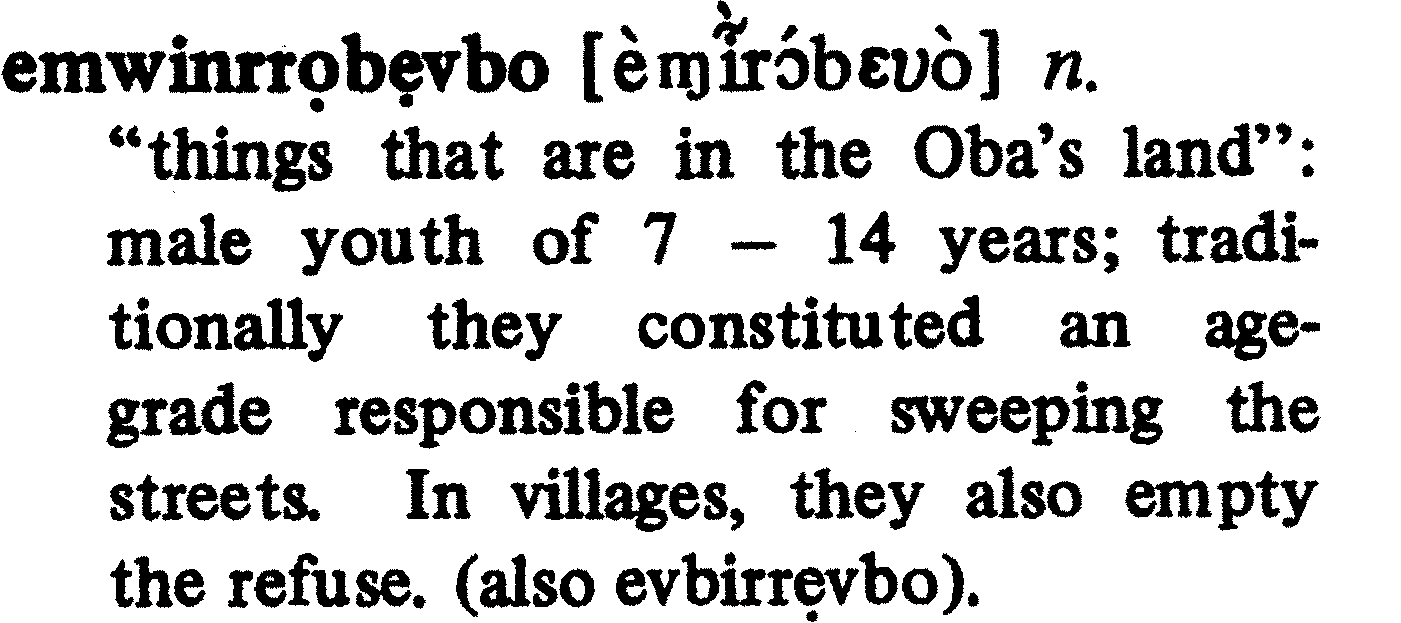
emwionko [èɱỹṍkɔ́ɔ̀] n. farm crops;
mainly cash crops.

emwionrhọ [èɱỹṍřɔ̀] n. harvest.

emwiunbiẹmwẹn [èɱyúbyɛ́ɱɛ̃̀] n.
“matter-of-childbirth.” labour.

emwiunwawa [èɱỹṹwàwà] n. bean
pottage made with palm oil.

ena [ènã̀] dem. pr. these, these ones:
Ena ẹre ọ khaa ― “These are the ones
he means”.

enamwunsin [ènáɱṹsĩ̀] adv. a long
period of time back, for long ago:
enamwunsin ọ ghise edinran ― it is a
long time since he got here: He has
been here for long.

enaimwẹn [ènã́iɱɛ̃̀] n. “my owner”;
“my lord”; a deferential address term
used by women to their husbands and
the latters’ relatives.

ene [ènẽ́] def. art. the: ene okpia
vboo? ― “Where is the man?”

enena [énẽ́nã̀] dem. these ones.

enenẹ [ènẽ́nɛ̃̀] adv. in groups of four;
fours.

enẹ [ènɛ̃́] num. four.

eneirrọvbugie [ènɛ́iɽɔ́ʋugyè] num.
%%

sixteen (i.e. four-missing-from-twenty).,
eneirrovbọgban ― “twenty-six”: (i.e.
four-missing-from-thirty).

enẹghẹdẹnẹ [ènɛ́ɣɛ́dɛ̀nɛ̃̀] n. four
days ago.

ení [ènĩ́] n. elephant; ení-amẹ ― “water
elephant”: hippopotamus.

enì [ènĩ̀] n. name (also erin).

enia [ènyã́] adv. thus; so; this manner.

enibokun [ènĩ́bòkṹ] n. cattle egret.

enigie [ènĩ́gyè] n. chiefs and other
titled rulers.

enii [énĩ̀ĩ́] dem. those ones.

enikaro [ènĩ́kàɽò] n. (< ene-i-karo)
“those who came in front”. 1. the
ancestors. 2. pioneers.

enikẹre [ènĩ́kɛ̀ɽè] n. the others; the
remainder.

enikhukhu [ènĩ́xùxù] n. pigeon (also
elikhukhu).

enitan [énĩ̀tã̀] n. prawns and shrimps.

eniwanrẹn [ènĩ́w̃ãɽ̃ɛ̃̀] n. 1. a de-
ferential address term used for a group
of elderly people. (sg. ― enọwanrẹn);
2. elders. eniwanrẹn-asọn ― “elders
of the night”: an idiomatic expression
for witches, wizards, and other evil
spirits.
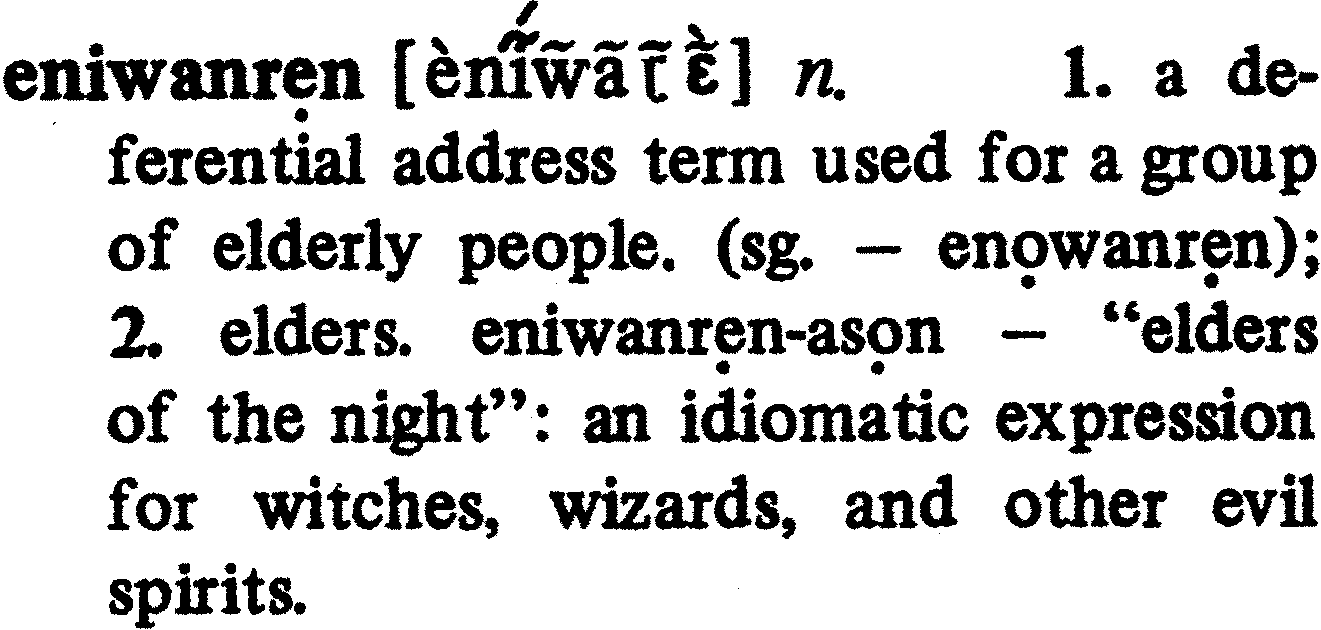
(e)nokpa [ènɔ́kpà] n. the other one.

enọyaenmwan [ènɔ̃́ỹãɛ̃́ɱã̀] n. “our
owner”: (in Christian sense): our Lord.

epa [èpàá] n. a colloquial address
term for a man, used mainly by young
people. (cf. Engl. Pa).
$Page 032$

epẹntiro [èpɛ̃̀tiɽó] n. petrol (cf. Engl.).

epianpian [èpyã́pyã̀] n. the piping
hornbill.

ére [éɽè] n. beans.

ère [èɽè] n. 1. profit; gain; advantage;
2. reward. Ọ rri ere iwinna esi ne ọ
winnaẹn ― He got the reward of the
good things he had done.

Erediauwa [éɽédyàúwà] n. name of
the reigning Ọba of Benin.

Eresọyẹn [éɽésɔ̀yɛ̃̀] n. name of a past
Ọba of Benin.

erẹrẹ [èɽɛ́ɽɛ̀] n. deception.

erẹnrẹn [èɽ̃ɛ̃̀ɽ̃ɛ̃́] num. eight.

ero [èɽó] n. deception; trick.

erọ [èɽɔ̀] n. knife.

eru [èɽù] n. placenta.

eruan [èɽ̃w̃ã́] n. any harmful charm.

erha [éřá] n. 1. father; male parent; 2.
ancestor for whom a shrine is mounted
in the home.

erherha [éřéɽ̌á] n. “father’s father”:
paternal grandfather.

erhiye [éříyé] n. “mother’s father”:
maternal grandfather.

erha-nagbọn [éřànág͡bɔ̃̀] n. “earthly
father”; lover.

erha-nasagbọnmiẹn [éřànàsàg͡bɔ̃̀myɛ̃́]\n. “father-one-reaches the world to
find”: foster father or benefactor.

erha-nọkhua [éřànɔ́xwà] n. “big
father”: grandfather.
%%

erha-odede [érháodèdè] n. great
grandfather; also grandfather.

Erhamwonsa [éřàɱṍsà] n. “Osa,
my father” an appellation for the
Supreme God, Osa.

erhan [èřã́] n. 1. tree; plant; shrub;
2. wood; stick, rod; 3. magical
charm.

erhe1 [èřè] n. part of the palm fruit
by which it is attached to the tree.

erhe2 [èřè] n. a copper stool said
to have been sent to the Ọba of
Benin by the Portuguese (Melzian p.
40).

erhẹn [èřɛ̃̀] n. fire.

erhẹnbavbogo [èřɛ̃̀bàʋógò] n. 1. a
shrub, Enantia affinis; the wood is
bright yellow on the inside and gives
off a yellow sap; 2. yellow colour.

erhẹnzọ [èřɛ̃́zɔ́] n. (< erhẹn + ẹzọ)
“wood of the law-suit” ― dock,
witness box. Iran tie ẹre ne ọ do sẹ
osẹ vbe erhẹnzọ ― “He was called to
the witness box to testify”.

erhẹrhẹ [èřɛ́řɛ́] n. a variety of melon,
used for soup.

erhigọẹn [èřìgɔ̃́ɛ̃̀] n. heron (also
etingọẹn).

erhindo [eřĩ do] n. (< erhan + ido)
“loom stick”: the rod to which the
threads are fastened in a loom.

erhọn [éřɔ̃́] n. craw-craw; rashes.
erhọnfọ ― heat rash.

erhuan [èřw̃ã́] n. shedded skin or
scales (e.g. of a snake).

erhuaengbe [èřw̃ã̀ɛgbè] n. disciples;
$Page 033$

followers; attendants.

erhumohi [èřúmohì] n. the dark-
heeled Cuckoo or Senegal Coucal.

erhunmwun [èřũ̀ɱũ̀] n. prayer
(mainly Christian sense, but also used
in traditional religion); blessing.

erhunmwunrriarria [èřũ̀ɱũ̀ryáryà] n.
butterfly.

erhunmwunyẹn [èřṹɱũ̀yɛ́] n.
stranger; guest in a house.

erhuru [èřúɽú] n. a variety of yam
that has a slightly bitter taste when
boiled.

erra [érá] n. ganglion.

erri [èrì] n. knotty part in a piece
of wood or creeper.

erria1 [èryá] n. grazing.

erria2 [èryá] n. 1. interpretation,
explanation (e.g. of code terms in
oracles or riddles).

erriarra [èryáryà] n. sandfly.

erriọ [èryɔ́] adv. thus; so; like that:
vbene u gie ẹrẹ, erriọ ẹre ọ wa gha ye
― “Just as you described it, so it was
exactly.”

errọ [èrɔ́] n. 1. the state of being a
tenant rather than landlord: errọ ẹre
o ye vbe òwa nii ― “He is a tenant in
that house.”; 2. suspense; uncertainty.

erru [èrú] n. a rack on which yam
harvest is arranged and tied for storage
and safe keeping.

esa [èsá] n. relevance; connection; con-
tribution in some enterprise: wẹ i
mwẹn esa ne u ye vbe ẹmwẹn na ―
%%

“You have no relevance in this matter,
i.e. there is no contribution you can
make in this matter.”

esagiẹn [èságỹɛ̃̀] n. blood (also
ẹrhaẹn).

Esago [ésàgó] n. the name of the god
of thunder, Sango; (also esango; isango;
& isago) (cf. Yoruba sango).

èsago [èságò] n. a large narrow-necked
bottle, usually encased in wicker-
work.

Esagho [ésàɣò] n. the name of the
chief wife of Ogiso, typically depicted
in Edo folktales as ill-fated.

esakpaede [èsákpáedè] n. 1. a variety
of drum, used for a dance by the same
name, and danced to by men (ighele).

esakparẹghodin [èsákpáɽɛɣòdĩ̀] n.
great-grandchild.

esalebo [èsàlébò] n. a plant, whose
black seeds are strung around a
calabash to make the musical instru-
ment known as “ukusẹ”.

esalọ [èsálɔ̀] n. a disease in the form
of small sores on hands and feet.

Esama [ésàmã́] n. the title of the chief
who performs the ama ceremony.

Esan [ésã̀] n. the Ishan people, one of
the tribes in the Edo ethnic group.

esatọde [èsátɔ̀déè] n. Saturday (cf.
Engl.).

esanmwan [èsã̀ɱã̀] n. any carved
bone or ivory.

ese [èsè] n. any sacrifice that should
have been made according to the
prediction of an oracle: ese ọ rre ọre
$Page 034$

egbe ne ọ na khuọnmwin ― “He is
sick because he is in default of making
a sacrifice that was predicted.”

eseku [èsèékʋ] n. a dwarf-like being
believed to wander in the dense forest,
with a woven mat tucked under his
armpit.

Esere [èsèrè] n. the title of a senior
chief of the Iwẹguae society.

eseso [èsésò] quant. some; any
(occurs only in negative clauses):
i sẹ evba, i ma miẹ iran eseso ― “I
got there and found none of them.”

esẹghẹsẹghẹ [esɛɣɛsɛɣɛ] n. the gum-
tree (Tetrapleura tetraplera).

esẹntimẹta [èsɛ̃̀tímɛ̃tà] n. centimetre
(cf. Engl.).

esi1 [èsì] n. bush-pig (also esi-oha). esi-
ebo ― domestic pig; hog.

esi2 [èsì] n. goodness; the right or
desirable qualities: ọmwan esi ― “a
person of goodness”; i.e. a good
person; emwin esi ― “a thing of
goodness”: a good thing.

esia [èsyá] n. hale; ikpesia ―
“halestone”.

esiasio [èsyásyò] n. the Bristlebill bird.

esiesi [èsyési] n. (< esi + esi) excellent
quality; perfection.

esieki [èsyɛ́kì] n. cheque (cf. Engl.).

esiga [èsìgá] n. cigarette (cf. Engl.).

esikpogho [èsíkpóɣò] n. the Bulbul.

esiliki [èsílikì] n. silk; also rayon (cf.
Engl.).
%%

esimẹti [èsìmẽ́tì] n. cement (cf. Engl.).

eso [èsó] n. some: eso rre emwan ―
“some are here.”

esoghosogho [èsóɣósóɣó] n. baby’s
rattle. (cf. sogho).

esosomaye [èsósómàyè] n. a charm,
having predictive power, owned by the
Ọba.

esọbiri [èsɔ́bìɽì] n. shovel, spade (cf.
Engl.).

esọbu [èsɔ́bù] n. shop; trading store;
workshop. (cf Engl.).

Esọgban [ésɔ̀gbã́] n. the title of a
senior chief, who is a member of the
Eghaevbo n’Ore, and who acts for
the Iyasẹ in his absence.

esọkisi [èsɔ́kìsì] n. socks (cf. Engl.).

Esọn [ésɔ̃́ɔ̃̀] n. the title of a senior
chief, who is a member of the
Eghaẹvbo n’Ore.

esọnde [èsɔ̃́dè] n. Sunday (cf. Engl.).

esọsi [èsɔ́sì] n. Church (cf. Engl.).

Esu [èsù] n. 1. in traditional religion:
the name of a harmful deity believed
to be sent by the other gods to cause
trouble: it cannot kill a man, but
would lead him into danger or temp-
tation; 2. In the Christian sense,
the Devil; Lucifer.
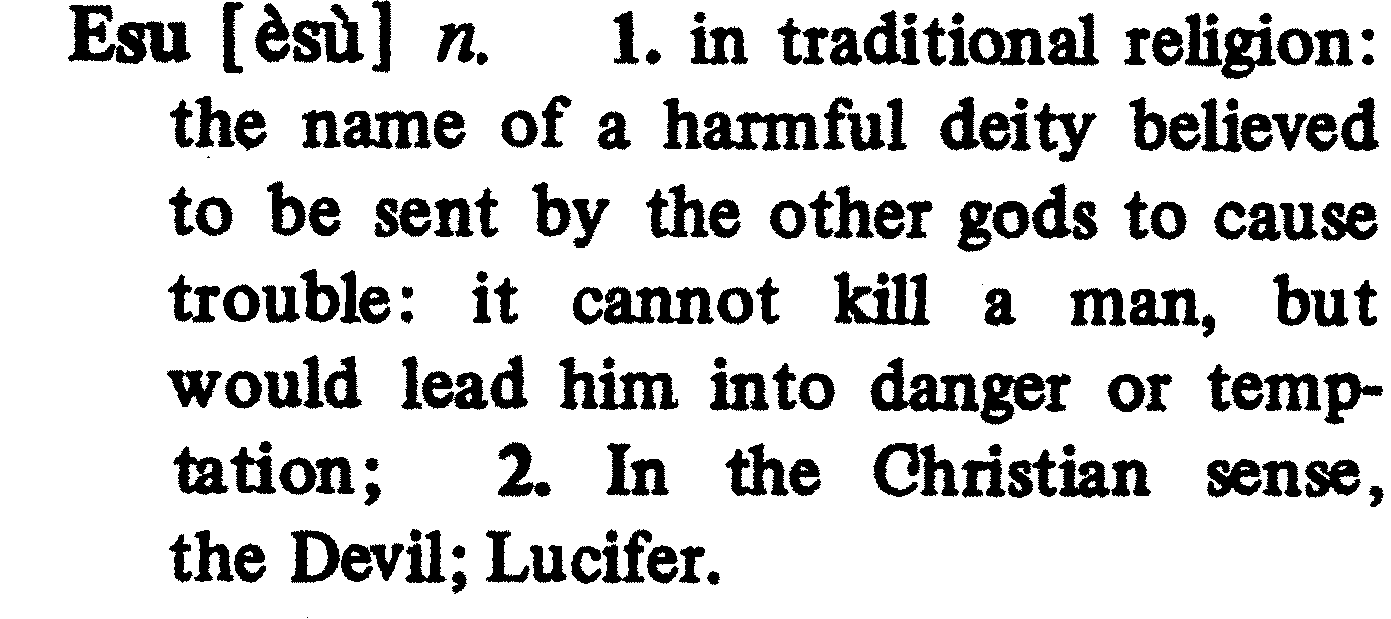
esughusughu [èsùɣùsúɣù] n. owl.

esuku [èsùkúù] n. school (cf. Engl.).

eta [ètá] n. talk; speech (also pl. of
ọta ― speech).

etalọ [ètálɔ̀] n. 1. utterances; 2. talk-
$Page 035$

ativeness.

etalugbo [ètálúg͡bó] n. a farmer’s
small wrap that he wears to the farm;
loin-cloth.

etaro [ètáɽò] n. (< eto ― aro) “hair
of the eyesbrows”: eyebrows.

ete [ètè] n. crisis; problem; trouble.

etebetebe [ètébétébé] n. a very small
insect that runs on the surface of water
in rivers, streams and ponds.

eteburu [ètébùɽù] n. table. (cf. Engl.).

etekia [ètékyá] n. (< eto ― ekia)
“hair of the penis”: male pubic hair.

etẹbitẹ [ètɛ́bítɛ̀] n. eternity; forever.

etẹlivisọn [ètɛ̀lìvisɔ̃̀] n. television (also
etiivi).

etẹn [ètɛ̃́ɛ̃̀] n. relatives; siblings. (also
pl. of ọtẹn ― relation).

etianran [ètĩã́ɽ̃ã̀] n. 1. peacock; 2.
silk.

etifuanro [ètífũã́ɽò] n. (< eto ― ifuẹn
― aro): “hair of the wings of the
eyes”: eyelashes.

etivi [ètìívì] n. television. (also
etẹlivisọn).

etingọẹn [ètĩ̀gɔ̃́ɛ̃̀] n. heron (also
erhigọẹn).

etisa [ètísà] n. teacher (cf. Engl.).

etitibiiti [ètìtìbíìtì] n. a black bird
with a lyre-shaped tail, believed to be
the king of birds.

eto [ètó] n. hair; eto nakiin ― “hair
plaited with thread”; eto namẹn ―
%%

“braided hair”; etonukẹn ― “kinky
hair”.

etolotolo [ètòlótòló] n. turkey.

etobatoba [ètòbàtóbá] n. 1. some-
thing that has become permanently
glued on to something else; 2. a per-
manent stain. (cf. toba).

etọghọtọghọ [ètɔ́ɣɔ́tɔ́ɣɔ́] n. rooster’s
crest at its throat.

etọnni [etɔ̃́nĩ̀] n. ton (cf. Engl.).

etuhe [ètúhè] n. (< eto ― uhe) “hair
of the vagina”: female pubic hair.

etuheru [ètùhéɽù] n. scissors (also
ugbeto; alumagazi).

eturarri [ètúɽàrí] n. frankincense.

etuu [ètúù] n. cannon.

eva [èvá] num. two.

evẹbu [èvɛ̃̀bù] n. verb (cf. Engl.).

evavu [èvávù] n. valve, in cars, motor-
cycles and bicycles; (also evav) (cf.
Engl.).

evé [èvé] n. weeping.

evè [èvè] n. elephantiasis of the
scrotum.

éveva [évèvá] quant. 1. both (also
èvèvá): viọ éveva mẹ ― “give both
to me”.

èveva [èvévà] adv. in pairs; two’s.

evẹn [èvɛ̃́ɛ̃̀] n. wrestle.

evie [évyé] n. a block with an iron
surface on which smiths work metal;
anvil.
$Page 036$

evuato [évwátò] n. grass-cutter.

evue [évwé] n. a variety of ant that
is found on corpses.

evba [èʋáà] adv. over there; there: mu
ye evba: “place it over there.”

evbaakhuẹ [èʋàáxwɛ] n. soap.

evbare [èʋàɽé] n. food.

evbarriẹ [èʋàryɛ́] n. an ingredient pre-
pared from melon, used in native
soups.

evbàvba [èʋàʋá] n. an address and re-
ference term meaning “father”, used
mainly by adults. It also conveys
some degree of respect and deference;
in Christian prayers, it is usually used
as an address term for God.
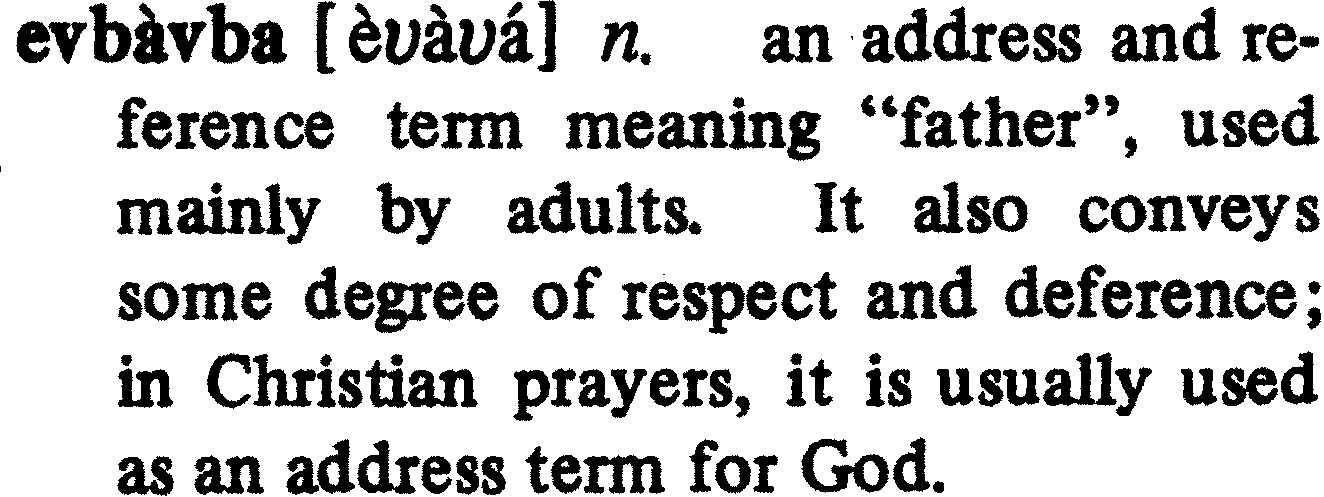
evbávba [èʋávà] n. 1. the supreme
authority; 2. an address term often
used for the Ọba.

evbayamose [èʋàyámòsé] n. soap
(also evbakhuẹ).

evbayawuo [èʋàyáwùó] n. body
cream; pomade.

evbibiọmọ [eʋibyɔmɔ̃] n. parents.

evbihiọrọ [eʋihyɔɽɔ] n. reptile.

evbikhọọ [èʋìxɔ̀ɔ́] n. something of no
value; a “no-good”.

evbisun [èʋìsṹ] n. a general name for
the different varieties of snails, such
as egile, akikọ, etc., derived from
their mode of crawling motion.

evbọ [èʋɔ́] n. scabies.

evbu [èʋúù] n. dew; morning mist.
%%

ewa [èwá] n. sleeping-mat made out of
the stems of ebiẹba.

ewan [èwã́ã̀] n. now (cf. eban).

ewanniẹn [èwã́nỹɛ̃̀] n. response;
reply; answer.

ewanmwẹn [éwã̀ɱɛ̃̀] n. palm branch
with the leaves on.

ewẹn [èwɛ̃́ɛ̃̀] n. 1. breast; 2. milk:
ya ewẹn nẹrẹn wẹn ― “breast-feed
it.”

ewẹnmila [èwɛ̃́mìlá] n. (< ewẹn ―
emila) “cow’s milk”: dairy milk.

ewi [éwí] n. a variety of fish, usually
sold in the smoked form.

ewindo [éwĩ́dò] n. window (cf.
Engl.).

ewinso [èwĩ́sò] n. whistle (cf. Engl.).

ewisiki [èwìsìkí] n. whisky (cf. Engl.).

éwọe1 [éwɔ́è] n. whistling (by mouth).

éwoe2 [éwɔ́è] n. lava of a fly found
under mats on mud beds that had
been urinated on. It causes itching
and craw-craw.

èwoe [èwɔ̀è] n. attendants; followers.

Eyaẹn [èỹã̀ɛ̃́] n. the name of a village
on the outskirts of Benin along the
Benin ― Auchi Road.

eyan [èỹã́] n. pledge; promise (cf. yan).

eyanyan [èỹã́ỹã̀] n. yawn (cf. yanyan);
yawning.

eyeyẹ [èyéyɛ̀] n. (< eyẹ ― eyẹ)
“grandchild-grandchild”: cousins.
$Page 037$

eyẹ [èyɛ́] n. grandchild.

ezẹ [èzɛ́] n. a chisel-like blade used by
wine-tappers; (cf. afian).

ezẹgizẹgi [èzɛ́gízɛ́gí] n. dysentery
diarrhoea.

ezikẹn [ézíkɛ̃̀ɛ̃́] n. 1. flute; it is made
from a long thin calabash, and played
during certain palace festivals; 2. the
whining of a child.
%%

ezini [ézĩ̀nĩ̀] n. engine (cf. Engl.).

ezinniya [èzĩ̀nĩ́yà] n. engineer (cf.
Engl.).

ezọbu [èzɔ́bù] n. job: usually daily-
paid labour, often requiring no
specialized skill.

Ezọti [èzɔ́tì] n. name of a past Ọba
who reigned in about 1473. (Egharevba
1968:73).
